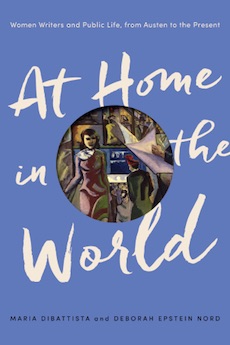Shortlisted for the 2018 Christian Gauss Award
By Indira Ganesan
Recently, I watched Wild Nights with Emily (2018), a film that put the notion of how myths are created to fabricate women’s lives at the forefront. We assume that Emily Dickinson was a spinster, that Jane Austen circumspect, because their families would have us believe so. It took infrared technology to discern that Emily Dickinson decided poem after poem to her lover and sister-in-law, Susan Gilbert, that her manuscript lines were altered by none other than her brother’s mistress. Director Madeline Olnek demonstrates how in her life, Dickinson didn’t shun publication—she craved it—but she wanted her vision to remain as she saw it, not as did an editor who might add titles to her poems, or create punctuation to makes the meaning “clearer.” Likewise, we don’t have Austen’s letters which were likely full of wickedly sharp observations on the society she mocked so well in her novels. Women’s lives were swept up, tidied by the angels of the house who required women to put down their pens.
“There comes a terrible moment tangible to many souls when the great movements of the world, the larger destinies of mankind, which have lain aloof in newspapers and other neglected reading. Enter like an earthquake into their own lives, when the slow urgency of growing generations turns into the trend of an invading army or the dire clash of the civil war,” George Eliot writes in Daniel Deronda. The world knocks at our door, and we must act. This is counter to the common idea of the domestic lives of women who continue their embroideries or knitting, attest the writers of At Home in the World, an idea that is a myth. Here, they offer “a different account of the history and trajectory of women’s writing, one grounded in the notion that its impulses ran toward public engagement rather than domestic entanglement.”
Maria Di Battista and Deborah Epstein Nord offer a wealth of Western writers who have much to say about the goings on of the world, from imperialism to slavery, labor unrest and tyranny. Indeed, Jane Austen offers Anne Elliott a way out in the form of sea voyages side by side with her sea captain husband in Persuasion, an Anne who is no longer restrained by the social constraints of her myopic father and friends. Virginia Woolf places her first heroine on a south seas adventure though she had not yet left the continent in The Voyage Out, and her Mrs. Ramsey dreams of a trip to the lighthouse, to bring socks and newspapers to the keeper and his son. Willa Cather’s heroines become the head of their families, supporting the mouths at home.
DiBattista and Nord take us to the ways in which home is both run away from, and a place to find. Immigrants, as penned by Jhumpa Lahiri and Edwidge Danticot, long to find a home, a quest that takes them away from the familiar to plunge into the unknown. That unknown is both physical displacement as well as moral soul-searching. Harriet Martineau, Elizabeth Gaskell, and Harriet Jacobs argue for social change, a call that Harriet Beecher Stowe took up in Uncle Tom’s Cabin. Elizabeth Barrett Browning took another writer to task for questioning the subject of the novel thus: “Is it possible that you think a woman has no business with questions like the question of slavery?…then she had better use a pen no more. She had better subside into slavery and concubinage herself…and take no rank among thinkers and speakers.” Taking up the pen, the authors suggest, is by its nature “a politically engaged act, a way to intervene in public life.” This life was denied so long, as they point out that though suffrage was granted in in 1928 in the UK, women did not vote in the General Election until 1948. Taking up the pen, women were always voyaging out.
Novelist Indira Ganesan was inducted into Phi Beta Kappa at Vassar College in 1982. Her books include The Journey (Alfred A. Knopf, 1990), Inheritance (Alfred A. Knopf, 1998) and As Sweet As Honey (Alfred A. Knopf, 2013).




